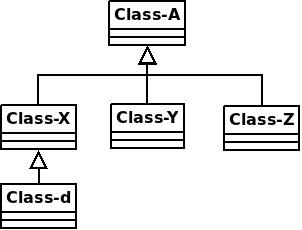Item 41: Use overloading judiciouslyBecause I'm going to use method overloading in my NullObjectProxy implementation I will give some additional information about when it is ok to use method overloading. I highly recommend that you read Item 41 but here is a little extra graphic help and also a relaxation of Joshua Bloch's criteria. To simplify the presentation I will assume that the return type of all methods here is void and I will not include the return type in the examples. For a method m(t1 x1, t2 x2, ..., tn xn) where t1 to tn are the n parameter types it is safe to create an overloaded version m(t'1 x1, t'2 x2, ..., t'n xn) if for each type ti (i=1 to n), t'i is not a subtype or supertype of t.
Lets look at a few examples. We will base those examples on the set of classes illustrated here We will use a one parameter method as our existing method to overload: m(Class-X x1)
The following overloaded versions would be ok:
m(Class-Y x1)
m(Class-Z x1)
The following would not be ok:
m(Class-A x1)
m(Class-d x1)
Had the original method been m(Class-A x1) there would have been no safe way to overload using the types in the diagram.
Had the original method been m(Class-d x1) then the following overloaded versions would have been ok:
m(Class-Y x1)
m(Class-Z x1)
But m(Class-A x1) or m(Class-X x1) would not be safe.
You get the idea.


No comments:
Post a Comment